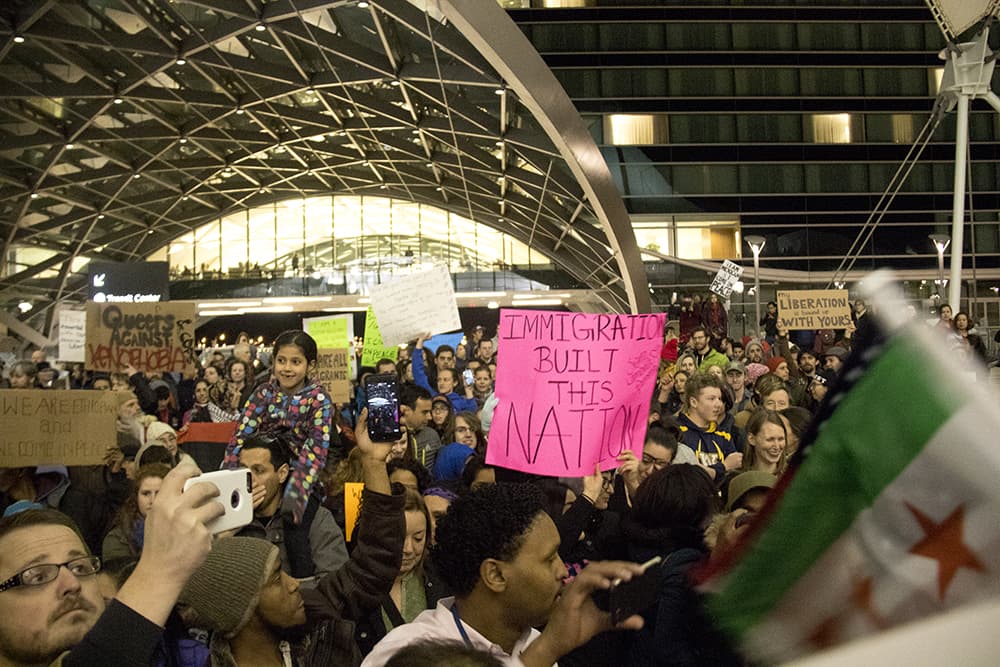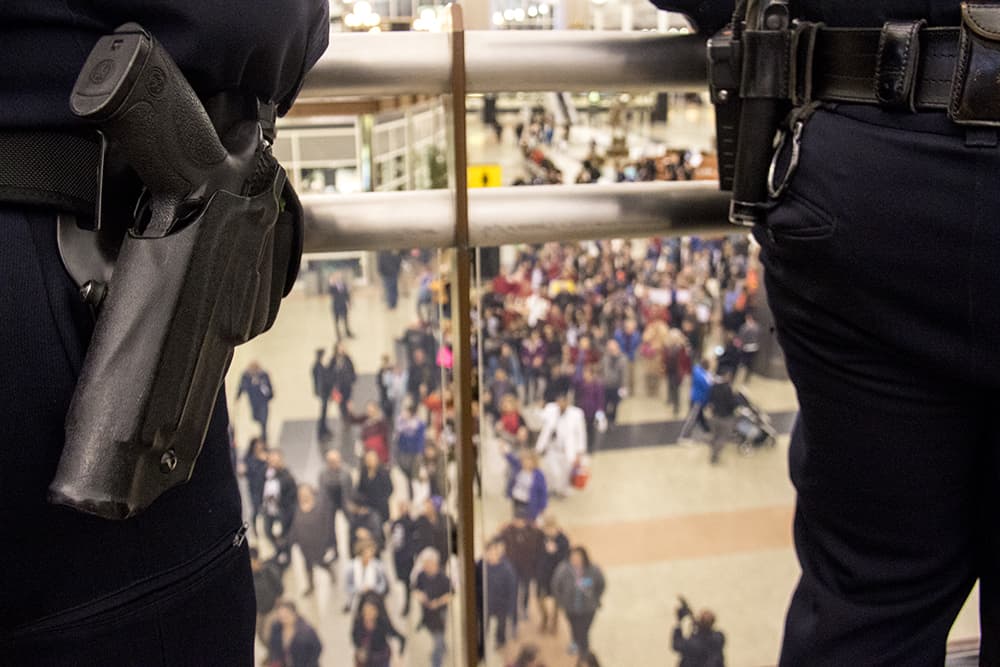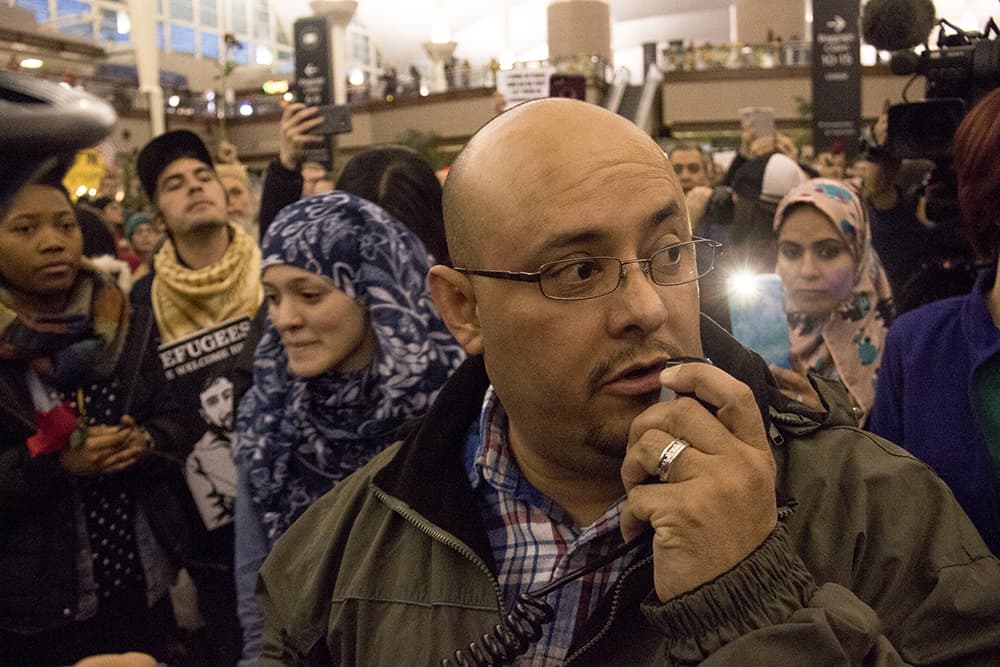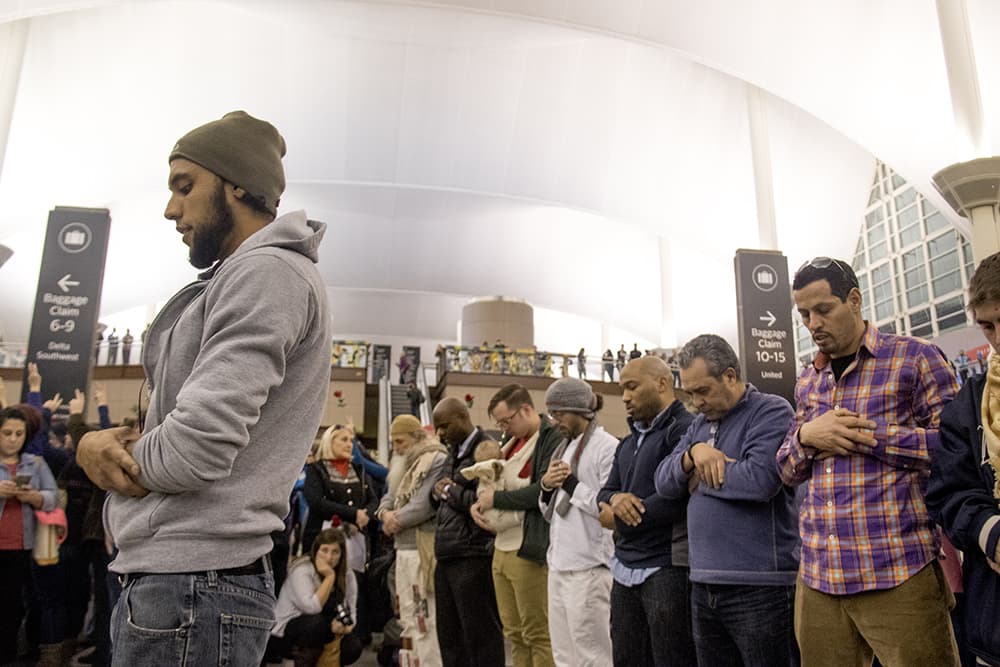
People who were threatened with arrest at Denver International Airport went to federal court for a day of sharp-witted exchanges with attorneys for the city of Denver, fighting for their right to protest at the international travel hub without applying in advance for a permit.
"If I wanted to live in a country where there was no First Amendment, I would go back to my home in Turkey and be arrested for talking," said co-plaintiff Nazli McDonnell, testifying on the eighth floor of the federal courthouse in Denver.
Judge William Martinez was not expected to rule today on the case, but hours of testimony provided a colorful look at an issue that's likely to face Denver again and again: Where can people protest, and when?
"Those are your rights," co-plaintiff Eric Verlo said. "If they convince you to abandon them, you've lost them ... and you never regain that opportunity again."
This legal debate began on Jan. 28 and 29, when hundreds of people flocked to the airport to protest President Donald Trump’s executive orders temporarily barring people from seven countries in the Middle East and North Africa from entering the United States, temporarily halting the entry of refugees and indefinitely banning Syrian refugees from entering the country.
On both days, Denver police officials told protesters that they could be arrested because they lacked a protest permit. The application process takes at least a week, which the plaintiffs argued would have mooted the purpose of the protests. In a Donald Trump presidency, they said, you can't see anything coming a week ahead.

"You can’t do anything seven days in advance of not knowing something," said Rep. Joe Salazar, a Colorado elected official who attended the Saturday, Jan. 28, protest and pushed the city to accommodate the protesters. "... The whole purpose on protesting the travel ban was to be there with travelers."
The city's attorneys, meanwhile, have correctly pointed out that protesters stayed for hours at the airport and no arrests were made. The first weekend of protest went on uninterrupted and protesters then could have filed for permits for future dates; therefore, the city's attorneys have argued, the rules didn't "chill" anyone's speech.
Disrupting the regular permit process, the city has argued, would "upset the status quo by opening the door to speakers and speech that would likely disrupt the safe, secure, and efficient operation of the nation’s fifth busiest airport."

The testimony gave some insight into how Denver International Airport prepared for the protest.
The plaintiffs called on Nadeen Ibrahim, an organizer of the larger Saturday protests. She said she and others received messages from Denver International Airport management prior to the event.
"Denver Police will not allow a protest at the airport tonight ...We are willing to work with you like any other group but there is a formal process for that," an airport official wrote to her in an email as the attendance list on the event's Facebook page swelled.
The protest went on anyway, with several hundred people gathering near international arrivals in the airport's main Jeppesen Terminal. (One person testified that they heard about it through Denverite.) As the protest grew, airport officials first offered the protesters an alternative demonstration spot far from the airport proper, and later asked them to move to an outdoor area near the new rail station, according to testimony.
"Were they singing? ... Were they chanting? ... Did they sometimes link arms?" attorney Writer Mott asked in cross-examination.
All that did, in fact, happen on the first day of the protests, but the participants maintained that they never blocked travelers' paths or damaged property. (Airport officials praised them after the fact for their peacefulness, according to an email message introduced on evidence.)
On the second day of the protests, only a handful of people showed up, including the plaintiffs, McDonnell and Verlo. Verlo was holding a rather profane message.
"It says ‘First they came for the Muslims, and we said, "Not today, motherfucker,"'" Verlo explained, examining a photograph of the sign he held for hours on the Sunday protest.
Some of the protesters on Saturday had said they were there as a welcoming party for a Muslim man named Omar who was said to be flying in from California. This would seem to play into part of the plaintiffs' argument, which pointed out that people regularly hold signs to welcome travelers, pointing in particular to events that praised military members.
In the past, people holding large flags and "Welcome home veterans," signs were never required to have permits, according to plaintiffs' attorney Andrew McNulty.
Some of the city attorneys' questioning focused on whether or not the travel-ban protest plaintiffs had tried to get a permit.
"You don’t know what the process is because you’ve never availed yourself of it," attorney Wendy Shea told Verlo during cross-examination. Verlo acknowledged that he felt getting permits set a "bad precedent" and wrongfully constrained others' behavior.
Verlo admitted that the city should have some power to regulate where protests happen and how large they can be, but he maintained that the two days of protests had little impact on the function of the airport.
"I believe that the right of free speech is something that’s fairly intuitive and it’s fairly common sense ... and that there are not supposed to be regulations and permits that infringe upon that right, unless they are pertinent to the function of that place," he said.
The plaintiffs have asked Judge Martinez to issue an injunction that would temporarily deactivate the airport's permitting requirement for protests. A ruling on that request may come this week, according to plaintiffs' attorney Andrew McNulty.













